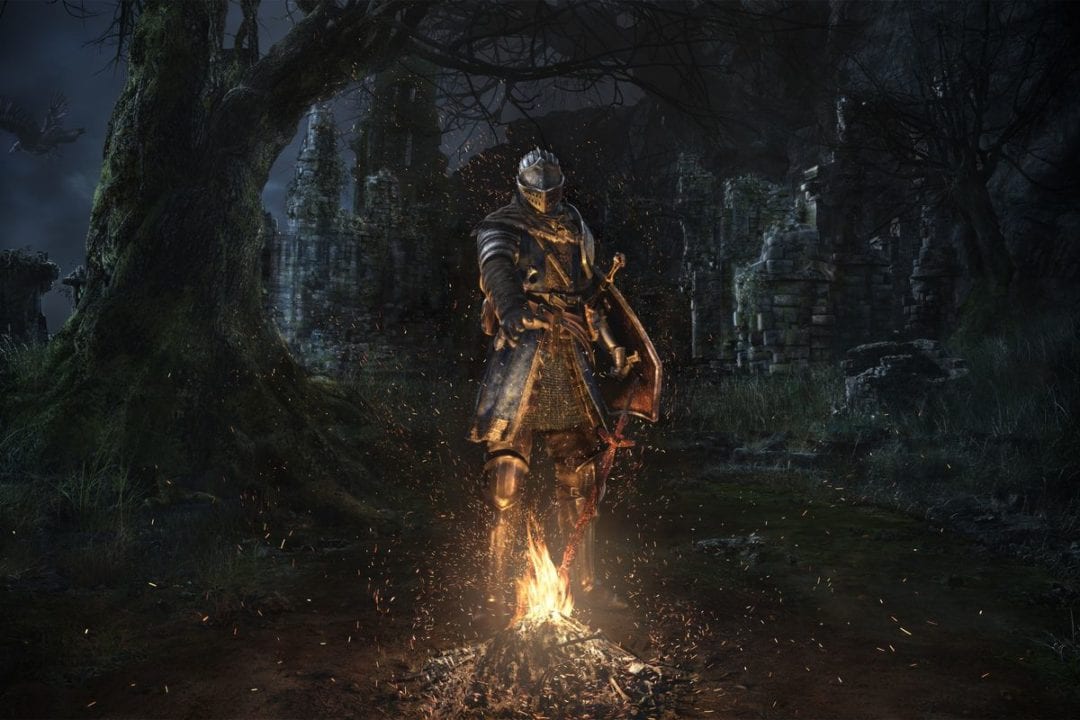“If Lancelot killed one of Gawain’s brothers while rescuing Guinevere wouldn’t the furies haunt him?” my girlfriend’s youngest daughter asked as I finished the story and tucked her in. “No,” I said. “The furies are only in Greek stories. It was how Greek people imagined guilt, because being guilty feels like being haunted.” Her eyes widened in a way only a child’s do. But it was time for lights out.
What makes one story feel like the legend of some lost culture rather than something a writer just made up? Why does a series like Dark Souls — which is just as much about running around with a sword killing monsters as any fantasy game — have the ability to fill players with wonder and sorrow through something as simple as a discarded set of armor or an abandoned grave? What makes something a myth as opposed to a mere story, and why do we find ourselves seeking myths out so fervently?
Odin and Vili and Ve killed the giant Ymir. It had to be done. There was no other way to make the worlds. This was the beginning of all things, the death that made all life possible. – Norse Mythology, by Neil Gaiman
Dark Souls, like its precursor Demon’s Souls and From Software’s sister title Bloodborne, is about killing monsters and boosting stats in the same way Norse mythology is about Loki messing with Thor, or Greek mythology is about some gods behaving badly. There are deeper things going on in the story of the god Gwyn, Lord of Cinder and the fading of his Age of Fire, which you learn as your cursed undead character travels along a twisting path toward self sacrifice or defiance. Gwyn’s superficial king of the gods role provides parallels with Zeus, the wielder of lightning, and Odin, who created a world order by slaying a primordial force. Dark Souls, like those mythological traditions and J.R.R. Tolkien’s The Silmarillion, is about the existential questions that arise from the implications of there being an ordered existence and an authority behind it. It questions not just of the human condition, but the condition of existence.
Your goal as one of the accursed undead of Lordran — and the other names the setting goes by in Dark Souls II and III — is to fight against the dying of the First Flame, the source of light and life at the center of the world. As you progress, you learn that Lord Gwyn’s shining world order has fallen into rot and ruin and every god and hero has died, gone mad, or vanished. Your task is to absorb the souls of the mightiest gods and then throw yourself on the pyre, as Gwyn did, to delay the coming of the darkness a little longer. Or you can simply not do that. Some have argued that it doesn’t matter which you choose, and that the cycle of death and rebirth is eternal and inexorable.
Along the way are a hundred little side plots and stories, implied by item descriptions as well as cryptic dialogue from NPCs and enemies that tell us of the other characters in Gwyn’s tale, and further demonstrate the way it’s informed by the myths that have shaped all fiction. Like the men in Zeus’ family tree, Gwyn casts out one of his sons. Like Odin, he struggles vainly against an apocalyptic ending to his world order that he ultimately can’t prevent. Like Vishnu, he must invest a mortal with the power to embark on the hero’s journey that will save the day. Like Tolkien’s Gondor (at least at first), Anor Londo is a faded capitol without a real ruler. Every piece of lore in Dark Souls provides a glimpse of some prelapsarian heyday that’s long since passed. You are just treading through its ruins.
Like all epic heroes, Gwyn tries to bend the world but he is the one who ultimately breaks. So, it is implied, will you. Maybe that’s why this story has inspired so much obsessive analysis. It’s why I gravitated toward the games, even though they are what I would call upsettingly hard in every sense — from the twisting routes to the esoteric character building to the truly demanding level of difficulty. It’s all too easy to see sobering parallels between the mad, dimming world of Dark Souls and our own climate-ravaged sphere, where ignorance is causing wasting diseases to run rampant and long-prosperous societies to come undone. It’s fair for us to question an all-powerful authority figure like Gwyn when patriarchy and toxic masculinity are giving us new things to be outraged over every day.

For me, Dark Souls also too sharply recalls one of my own breakings. After five years watching talented colleagues with decades of experience in the newspaper business laid off and thrown out, I decided I’d had enough. My last day was a Saturday, and I was alone in the hollowed out remnant of the newspaper’s building. I went to the basement for a box to clean out my desk. Old IBM typewriters, forgotten Christmas decorations, and an abandoned weight room all languished under the dust of decades as an eternally dripping faucet echoed from somewhere in the dark.
The old myths, populated with ravenous monsters who stalk the dark beyond the campfire and heroes with magic shields and endlessly replenishing pots of food, feel like they came from a time where hunger and the unknown were our worst enemies. When I wandered through the remains of Anor Londo just hoping to get what I needed and get the hell out, it felt like I was being told a story written by somebody who stood in that same basement.





Published: Feb 15, 2019 09:00 am